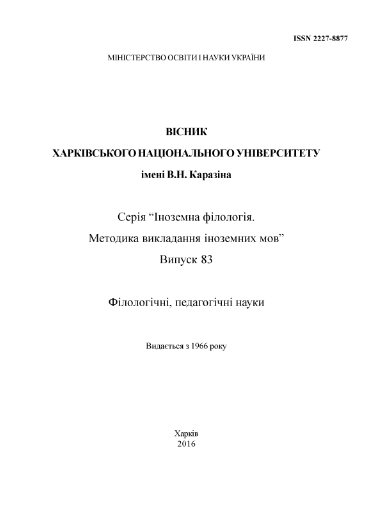Schema theory as instrument of analyzing humour in long narratives
Keywords:
background knowledge, jab line, knowledge schema, narrative, schema theory
Abstract
The article studies humorous lines in long narratives. Basic provisions of the Schema Theory were used to carry out linguistic analysis of such narratives. The main thesis of this theory is the influence of the reader’s background knowledge on his/her perception and understanding of new information, therefore the article describes the process of interaction between the information in the narrative and the background knowledge of the reader, and impact of this knowledge on understanding humour incorporated in the narrative.
Downloads
Download data is not yet available.
References
Самохіна В.О. Жарт у сучасному комунікативному просторі Великої Британії та США : монографія / В.О. Самохіна. – Вид. 2-е, перер. і доп. – Х. : ХНУ імені В. Н. Каразіна, 2012. – 360 с.
Anderson R. A Schema-theoretic View of Basic Processes in Reading Comprehension / R. Anderson, P. Pearson. – University of Illinois at Urbana Campaign, 1984. – P. 255–291.
Attardo S. Script Theory Revis(it)ed: Joke similarity and joke representation model / S. Attardo, V. Raskin // HUMOR: International Journal of Humor Research. – 1991. – № 4 (3/4). – P. 347–411.
Bartlett F. Remembering: A Study in Experimental and Social Psychology / F. Bartlett. – London : New Psychological Linguistics, 1932. – P. 201.
Carrell P. Schema theory and ESL reading pedagogy / P. Carrel, J. Eisterhold. – TESOL Quarterly. – 1983. – № 17 (4). – P. 553–569.
Carrell P. Interactive Approaches to second Language Reading / P. Carrell, K. Devine, D. Eskey. – Cambridge : Cambridge University Press, 1988. – 100 p.
Cook G. Discourse and Literature: the Interplay of Form and Mind /Guy Cook. – Oxford : Oxford University Press, 1994. – 285 p.
Griffin L. Narrative Event-structure Analysis and Causal Interpretation in Historical Sociology / L. Griffin. – American Journal of Sociology. – 1993. – № 5. – P. 1094–1133.
Marszalek A. Humorous Worlds: a Cognitive Stylistic Approach to the Creation of Humour in Comic Narratives / Agnes Marszalek. – University of Glasgow, 2012. – 32 p.
Nisbett R. Cultural Schemas, Relational Schemas, and Prejudice against Out-groups / R. Nisbett, O. Ybarra, J. Sanchez-Burks. – Journal of Personality and Social Psychology. – 2000. – № 79 (2). – P. 174–189.
Raskin V. Semantic Mechanisms of Humor / Viktor Raskin. – Dordrecht – Boston – Lancaster: D. Reidel, 1985.
– 302 p.
Rumelhart D. Accretion, tuning and restructuring: Three modes of learning / D. Rumelhart, D. Norman. – Semantic Factors in Cognition (J.W. Cotton & R. Klatzky (Eds.)). – 1978. – Hillsdale, NJ : Erlbaum. – P. 37–53
Schemata: The building blocks of cognition / [Rumelhart D., Spiro R., Bruce B, et. al] – Hillsdale : Erlbaum, 1980. – 150 p.
Stone L. The Revival of Narrative: Reflections on a New Old History / L. Stone. – Past and Present, 1979. – № 85. – P. 3–24.
Anderson R. A Schema-theoretic View of Basic Processes in Reading Comprehension / R. Anderson, P. Pearson. – University of Illinois at Urbana Campaign, 1984. – P. 255–291.
Attardo S. Script Theory Revis(it)ed: Joke similarity and joke representation model / S. Attardo, V. Raskin // HUMOR: International Journal of Humor Research. – 1991. – № 4 (3/4). – P. 347–411.
Bartlett F. Remembering: A Study in Experimental and Social Psychology / F. Bartlett. – London : New Psychological Linguistics, 1932. – P. 201.
Carrell P. Schema theory and ESL reading pedagogy / P. Carrel, J. Eisterhold. – TESOL Quarterly. – 1983. – № 17 (4). – P. 553–569.
Carrell P. Interactive Approaches to second Language Reading / P. Carrell, K. Devine, D. Eskey. – Cambridge : Cambridge University Press, 1988. – 100 p.
Cook G. Discourse and Literature: the Interplay of Form and Mind /Guy Cook. – Oxford : Oxford University Press, 1994. – 285 p.
Griffin L. Narrative Event-structure Analysis and Causal Interpretation in Historical Sociology / L. Griffin. – American Journal of Sociology. – 1993. – № 5. – P. 1094–1133.
Marszalek A. Humorous Worlds: a Cognitive Stylistic Approach to the Creation of Humour in Comic Narratives / Agnes Marszalek. – University of Glasgow, 2012. – 32 p.
Nisbett R. Cultural Schemas, Relational Schemas, and Prejudice against Out-groups / R. Nisbett, O. Ybarra, J. Sanchez-Burks. – Journal of Personality and Social Psychology. – 2000. – № 79 (2). – P. 174–189.
Raskin V. Semantic Mechanisms of Humor / Viktor Raskin. – Dordrecht – Boston – Lancaster: D. Reidel, 1985.
– 302 p.
Rumelhart D. Accretion, tuning and restructuring: Three modes of learning / D. Rumelhart, D. Norman. – Semantic Factors in Cognition (J.W. Cotton & R. Klatzky (Eds.)). – 1978. – Hillsdale, NJ : Erlbaum. – P. 37–53
Schemata: The building blocks of cognition / [Rumelhart D., Spiro R., Bruce B, et. al] – Hillsdale : Erlbaum, 1980. – 150 p.
Stone L. The Revival of Narrative: Reflections on a New Old History / L. Stone. – Past and Present, 1979. – № 85. – P. 3–24.
Published
2016-07-07
How to Cite
Найдіна, Є. С. (2016). Schema theory as instrument of analyzing humour in long narratives. The Journal of V.N. Karazin Kharkiv National University. Series: Foreign Philology. Methods of Foreign Language Teaching, (83), 156-161. Retrieved from https://periodicals.karazin.ua/foreignphilology/article/view/6174
Section
Stylistics and lexicology




